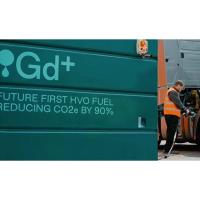Eland's Fleet Moves to HVO Biofuel
For its HGV fleet, Eland Cables is switching from Diesel to Biofuel. This is a game-changer in terms of carbon emissions reduction and environmental protection. It’s more than just a gesture – by using a RED-II compliant GreenD+ biofuel (a sustainable form of hydrotreated vegetable oil) it’s helping to reduce fleet CO2 emissions by over 90%.
There’s no escaping the fact that in terms of carbon emissions, transportation is a big contributor to the overall embodied carbon in any cable product. Behind the extraction and processing of raw materials, and the manufacturing of the cable itself, the trans-European (or trans-continental in some cases) movement of finished cables it’s the next biggest factor. Cables will be loaded onto Heavy Goods Vehicles (HGVs) and shipped thousands of miles from manufacturer to supplier before moving onto the end customer site.
Whilst the news may carry stories about electric HGVs and other blossoming technologies that offer cleaner modes of transport, the reality is that the vast majority of large commercial vehicles on the road are diesel powered and will be for some time. The cost of the vehicle and the accompanying chargepoint is prohibitive to most, whilst a range of 130miles makes it suited to more local hub/spoke deliveries – it’s one of the reasons Tesco was able to introduce their first Electric lorry into their fleet in August 2022.
Eland Cables already have Electric Vans in their fleet – making deliveries of reels, pallets and small drums – but for the large drums that can weigh up to 10T each, their EVs won’t fit , let alone be able to manage the weight.
Modern Euro6 rated engines in HGVs are the most efficient ‘ICE’ (internal combustion engine) currently on the road and include features such as engine cut-outs whilst idling so as to provide fewer emissions – and the Eland fleet all meet this standard (as required of FORS Silver status). Yet they realised it wasn’t enough. The big consideration was that any change needed to be practical for the fleet both home and abroad. The fleet makes ‘door-to-door’ deliveries across Europe so there’s no point having a solution that only works close to our principal hub. Biofuels are already common in many countries on the continent plus it allows for dual-fuelling in the event the driver needs to top up with fuel somewhere that HVO isn’t readily available.
After a trial and comparative study last year, Eland Cables made the decision to install a 200,000 litres fuel tank at their main Denaby site. The fleet has been running on biofuel as the principle fuel (and for many of the UK & Ireland based vehicles, their sole fuel) for more than 6 months now. The added bonus being it eliminated the short but regular journeys to nearby fuelling stations – in itself adding up to considerable annual mileage.
